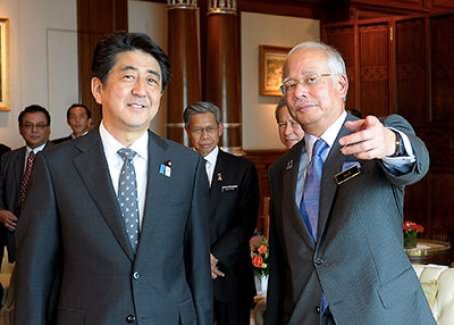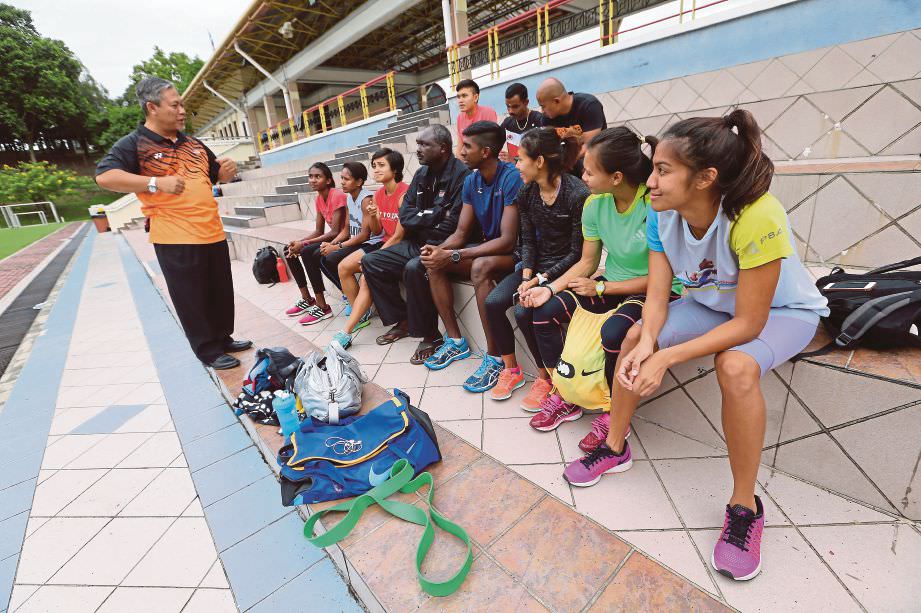SECOND WAVE: Policy to be tailored to suit economic transformation, say Najib and Abe
PUTRAJAYA: MALAYSIA and Japan will continue the Look East Policy under the second wave, which will be adjusted to suit the economic structure and priorities of both countries.
Prime Minister Datuk Seri Najib Razak, who received a visit from his Japanese counterpart, Shinzo Abe, yesterday, said the policy should be more progressive, with better focus and be more economy-oriented.
“We have agreed that after 30 years of successful collaboration, the next phase needs to be tailored for the economic transformation of both countries.”
Najib said both governments had pledged to encourage more partnerships between Malaysian and Japanese companies in various fields, including green technology, key technical services and institutional support.
“Therefore, we encourage both sides to develop more targeted programmes with specific outcomes to attain our countries’ objectives through investments, trade, Islamic finance, technology, infrastructure development and promotion of the halal industry.
“We welcome Abe’s interest in Malaysia and we will continue with our investment-friendly policies to further stimulate private sector cooperation,” said Najib at a joint press conference in conjunction with the official visit of the Japanese prime minister. This is Abe’s second visit to Malaysia.
Earlier, Najib and Abe witnessed the signing of two memoranda of understanding between 1Malaysia Development Bhd (1MDB) and Japan Bank of International Cooperation (JBIC) and another one between 1MDB and Toshiba Corp.
In the first MoU, the cooperation will open opportunities for both countries to benefit from Samurai bonds under the Guarantees Acquisition towards Tokyo market enhancement facilities, which will be the first bond to be issued by a Malaysian company with JBIC’s guarantee.
The second MoU will cover two phases, which will create opportunities for 1MDB to expand further into medical tourism, one of its key sectors, and potentially lead to the setting up of the first carbon ion radiotherapy centre in Southeast Asia.
On financial cooperation, Najib said both nations welcomed efforts to initiate discussions regarding the renewal of the bilateral swap agreement.
“We hope for more involvement from Japanese business players to engage in Islamic finance-related activities with Malaysia and we will offer the technical assistance.”
Najib said Malaysia welcomed collaborations between the private sectors of the two countries in various infrastructure projects in Malaysia, including green technology, water treatment and high-speed rail.
Tourism and youth exchanges were other aspects that both nations could explore further, Najib said, and he was upbeat with what had been done so far and invited Japanese retirees to consider taking part in the “Malaysia: My Second Home” programme.
Najib said more efforts would be made to check piracy and ensure safe passage for ships using the Straits of Malacca.
Abe said he shared the same views with Najib to improve ties between Japan and Malaysia. He said Japan would work closely with Malaysia, including supporting Malaysia’s growth using Japanese high-technology know-how, including in high-speed rail. Japan, he added, would continue its cooperation with the Malaysian Maritime Enforcement Agency to enhance effectiveness in addressing security issues.
Earlier, Abe was accorded an official welcome at Bangunan Perdana Putra here in conjunction with his two-day visit. He was greeted by Najib, Deputy Prime Minister Tan Sri Muhyiddin Yassin, Chief Secretary to the Government Tan Sri Dr Ali Hamsa and other ministers.
Abe and Najib then held a closed-door meeting to discuss bilateral, regional and international issues.
Najib also hosted Abe to an official dinner at Seri Perdana last night.
In a briefing to the media yesterday, the Japanese Foreign Affairs Ministry International Press Division’s Assistant Press Secretary Director Masaru Sato said the meeting between Najib and Abe involved a host of issues on bilateral collaboration.
Among issues discussed were Japan’s efforts to introduce Carbon-Ion therapy for treatment of cancer in local hospitals, making Malaysia one of the first countries outside Japan to use the ground-breaking technology for curing the terminal illness.
The Japanese defence agencies are also collaborating with the Malaysian Maritime Enforcement Agency to provide training to local enforcers on safety aspects concerning the seafaring operations.
Sato said the safety training, which began at the coast guard academy in Gebeng, Kuantan yesterday, was part of the Japanese government’s effort in promoting security within the region and strengthening its educational training capacity .
“This includes the South China Sea and the Malacca Straits, which are prime routes for the transportation of crude oil to Japan,” he said.
On territorial disputes involving the South China Sea, Sato said Abe expressed the importance of all countries involved to abide the international law.
He said Abe’s visit was also focussed on revitalising Japan’s economy.
Najib was also said to have expressed concern about North Korea, to which Abe had emphasised Japan’s stance on holding a series of dialogues with their military-oriented neighbours on denuclearisation.
Sato said the Foreign Affairs Ministry was also in the midst hosting the Japan-East Asia Network of Exchange for Stu dents and Youth (JENESYS 2.0).
The student exchange programme, which involved some 30,000 participants from ASEAN countries, will bring some 900 Malaysian students into Japanese homes to experience Japanese cultural enrichment by next year
-NST








